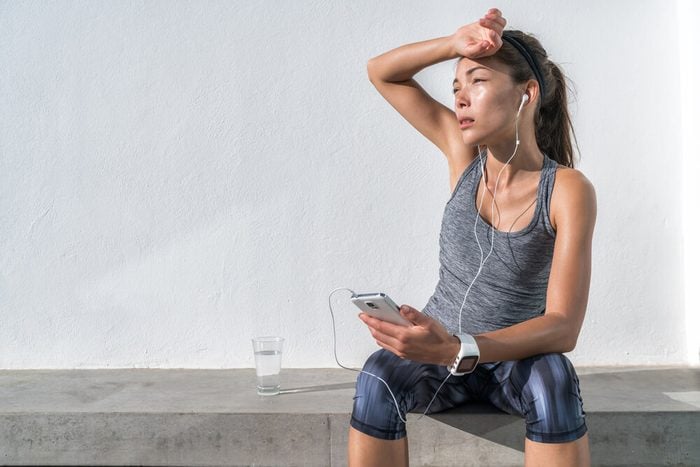
What is overheating?
If you’ve ever felt faint in a hot yoga class or looking for shade because the sun’s rays are making your brain bubble, you’re somewhat familiar with overheating. “Becoming overheated simply means your body cannot cool itself off or return to its normal optimal temperature, which is usually around 98.6 degrees Fahrenheit for most individuals,” explains Roger E. Adams, PhD, CISSN, a doctor of nutrition and owner of EatRightFitness. “An overheated state is usually caused by exposure to extreme heat over an extended period. When your body temperature rises, blood flow to the surface of your body increases. Additionally, sweat rate and respiratory rates increase, in order to cool your body off. All of this creates an extra workload on the heart, increasing your heart rate.”
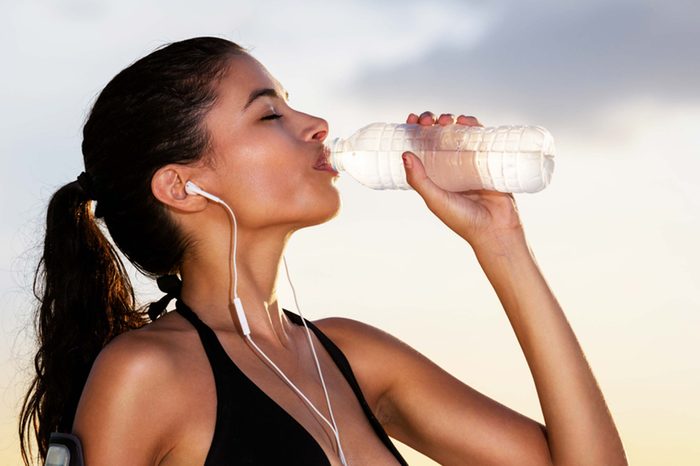
Why it’s dangerous
Overheating is risky because it’s a prelude to other sun-induced trouble. Adams explains that when you’re overheated, you sweat more quickly, causing you to be dehydrated as your body loses large amounts of water via your pores in an effort to regulate. “Dehydration further places a strain on the heart, and since the heart is already working hard at pushing blood flow to the skin, this can lead to a dangerous situation for your heart,” he says. “An overheated state puts the body’s most vulnerable and delicate tissues at risk: nerve cells in the brain and throughout the body. This can lead to confusion, memory impairment, and even loss of consciousness.”
The 3 Best Hydrating Beverages That Aren’t Water, from a Certified Sports Dietitian
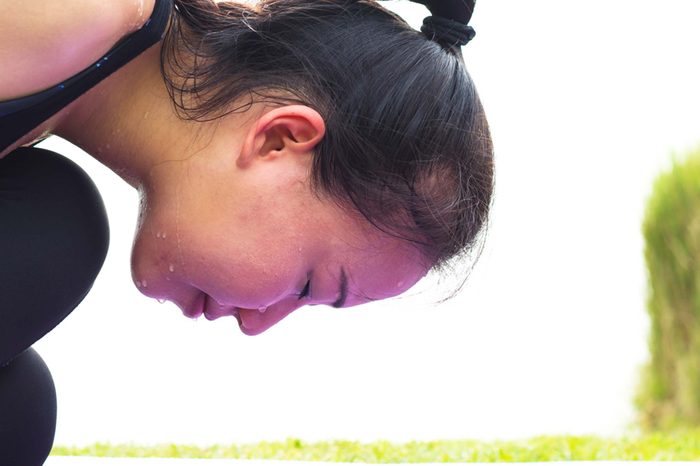
Warning sign #1: Sweating profusely
Everyone sweats at different rates, but pay attention to your particular patterns. The way you sweat can say a lot about your health, so you should be aware if you’re starting to notice a change in the amount of sweat you’re dripping. “Initially, the body will try to cool itself off by sweating more,” says Tania Dempsey, MD, with Armonk Integrative Medicine. “But as one gets more dehydrated, sweating can stop and this is very dangerous. Without sweat, the body loses its ability to cool itself off and the internal temperature will start to rise, leading to heatstroke.” If you’re not sweating at all, Dr. Dempsey says to get as cool as you can by leaving the heat, shedding clothes, drinking water and applying ice packs or taking a cool bath if necessary.
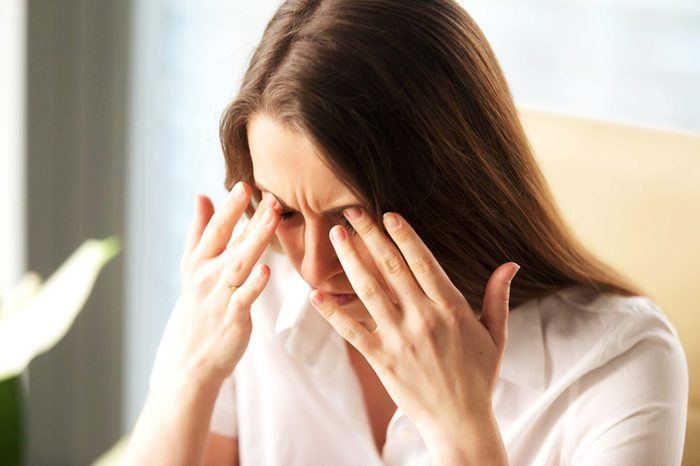
Warning sign #2: Dizziness
One of the earliest clues that you’re getting overheated is mental changes, Adams says. “As delicate nerve tissues in the brain are heated up, headaches, confusion, mental lethargy and dizziness occur. Additionally, nerve tissues in the body may start to function erratically, leading to impaired movement or an inability to move at all,” he explains. You may even begin to feel nauseous. If weird feelings are coming on or a headache is setting in, take a break in the shade or head indoors—and drink plenty of water to help tame your temperature.
Here’s How Much Water You Really Need in a Day, with Nutritional Scientists’ Latest Wisdom
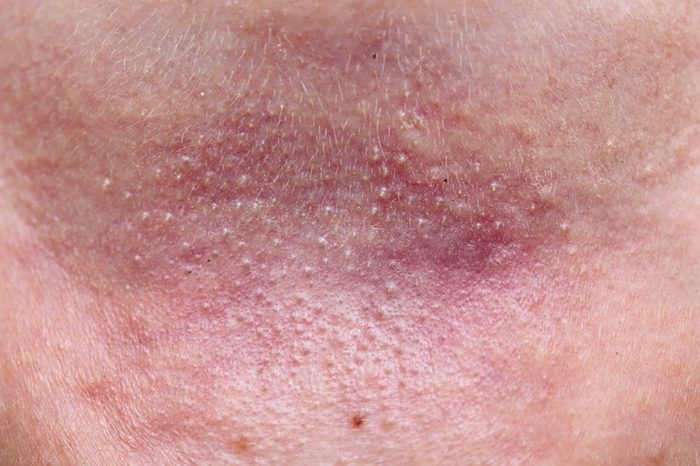
Warning sign #3: Heat rash
A heat rash is an unwelcome and unusual redness that could be your body letting you know it needs a break. “Heat rashes occur when sweat ducts get blocked, often by heavy clothing, and the sweat gets trapped under the skin, causing it to get inflamed and swollen with red bumps, also known as ‘prickly heat,'” Dr. Dempsey says. “Dress in loose, light clothing during hot, humid weather and stay in the cool shade to prevent this from happening.”
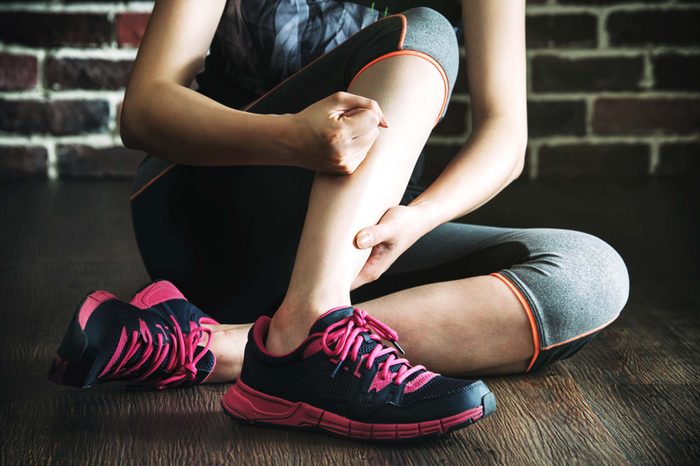
Warning sign #4: Muscles cramping
If your calf locks up or your quads cramp, fair warning: Dr. Dempsey says some of the earliest signs of heat exhaustion occur in our large muscle groups, often feeling like a spasm or a painful cramp. “This usually happens in people who are active outside in hot and humid weather and who are dehydrated and/or are deficient in electrolytes,” she says. To work through this, you’ll need to cool down, sit down and gently stretch until the tingling goes away.
These Gentle Exercises May Be the Key to a Longer Life, Say Experts

Risk factor #1: You’re outdoors a lot more than usual
On vacation especially, you can end up doubling your time under the hot rays. Even on weekends around the house, as Adams notes, nice weather leads to people wanting to go for more runs, enjoy water sports longer or even toss a ball for hours, putting them at a higher risk for overheating. “Exercising or performing various physical activities in the heat of the day can lead to elevations in body temperature; especially if the individual isn’t properly hydrated, to begin with,” he notes. “I have my athletes that train and play in the summer weigh themselves before a practice or game and then immediately after. For every pound they lose, they should consume two cups of water as soon as possible.”
‘Water Recipes’ Have Taken Over Social Media, but Are They Healthy?

Risk factor #2: You’re imbibing more
“The consumption of alcohol can accelerate a dehydrated state, and this leads to a quick rise in body temperature when outside, especially at those summer barbecues and concerts,” warns Adams. He notes that many of his patients are chronically dehydrated because they don’t double-up on their water intake to make up for sweating more and drinking, which also causes you to dry out. he says. A good rule of thumb is alternate a glass of water with each wine or beer you have.
5 Ways Alcohol Can Sabotage Your Weight Loss Goals, According to an Obesity Doctor

Risk factor #3: You’re getting older
While there are perks to getting older, your health and habits get more complicated with each new candle on the birthday cake. According to Dr. Dempsey, the elderly are at a higher risk for a heat-related illness like overheating, because the aging body has more difficulty regulating internal temperature. This helps explain why visits to grandma and grandpa’s house can be like stepping into a deep-freeze or a blast furnace. It’s especially important for people over 55 to drink plenty of fluids and limit time in the heat.

Risk factor #4: Taking prescriptions
The amount of time you can spend in the heat can change dramatically depending on a prescription drug, says Dr. Dempsey. “People who take certain medications, especially diuretics which can dehydrate, are more susceptible to heat issues.” If you’re finding yourself getting worn out faster than your pals, chat with your doctor who can offer an alternative solution to get you off of meds during the warmest season of the year.

